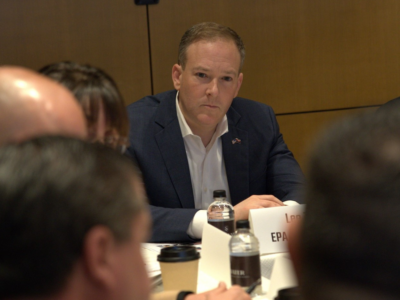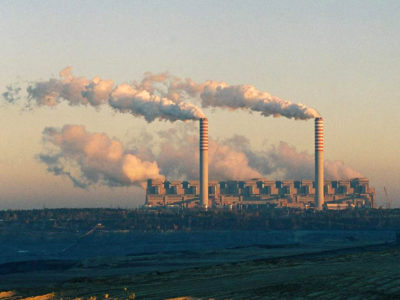Legal Safeguards Against Deregulation
Congress was aware that there could be a backlash against environmental standards. It took precautions.
While Trump finds “tariff” one of the most beautiful words in the English language, I myself prefer “anti-backsliding.” Back in January, Trump told EPA to roll back efficiency standards on everything from lightbulbs to shower heads. Some news outlets viewed this as an accomplished task, with headlines like “Trump Rolls Back Energy Standard.” But, as it turned out, not only was it not a done deal, it was also legally impossible. The reason: an anti-backsli...
CONTINUE READINGEPA Jumps the Shark
Just as a past dictator rejected modern genetics, Trump rejects climate science. For both, evidence was no match for ideology and ego.
“We are driving a dagger through the heart of climate-change religion and ushering in America’s Golden Age,” or so said EPA Administrator Lee Zeldin, who used to be considered a fairly rational person. This is known as drinking the Kool-Aid, and it's something that usually ends badly. Specifically, Zeldin said EPA would reconsider (and presumably revoke) its finding that greenhouse gases "may endanger human health or welfare." This is actually a position t...
CONTINUE READINGMake America’s Environment Filthy Again
EPA Administrator Lee Zeldin has launched a full-scale attack on climate, air and water pollution.
In what is one of the most mind-boggling press releases ever to come out of the Environmental Protection Agency, Administrator Lee Zeldin today declared that he wants to make America's air and water dirty again and to make the planet still warmer. He announced 31 actions that will obliterate protections for cleaner air, cleaner water, and a more stable climate. Each of the regulations Zeldin is seeking to roll back is worthy of a separate blog post. Each tackles a...
CONTINUE READINGU.S. Resistance to Trump is Alive and Well
Thousands of people rallied at more than 100 Stand Up for Science events from Missouri to France. Where will the movement go from here?
Several thousands of people took to the streets this past weekend in more than 100 cities to protest the Trump administration’s wide-ranging attacks on vital scientific research, including its attempts to slash funding to the National Institutes of Health and hence local universities and research labs across the country. The result was small but potent demonstrations in red states like Missouri, Montana, and Ohio as well as big crowds in Boston, New York, Philad...
CONTINUE READINGThe Legal Complexities of Deregulating Power Plant Carbon Emissions
The Supreme Court struck down Obama’s powerplant regulation. but it didn’t endorse Trump’s first try either.
EPA’s efforts to regulate carbon emissions from powerplants have had a tortuous history, and we’re about to go through another round, with a rule from a Democratic Administration being repealed and replaced by a Trump rule. The last time this happened, the Trump EPA said that its interpretation of the statute required an extraordinarily narrow substitute rule. Because of intervening legal changes, it won’t find it as easy to make that argument this time. In the end...
CONTINUE READINGShould Blue States Punish Tesla?
The political economy implications of how EV tax credits are distributed
In the wake of Elon Musk’s role in the new administration and its efforts to fire large numbers of federal employees, some Democratic state elected officials have called for rethinking EV subsidies to cut out Tesla. There is also evidence that Democratic state legislators have become much more hostile to Tesla lobbying. Matthew Yglesias, a well-known commentator on the center-left, has argued that this is a misguided response, and instead that Democrats should trim...
CONTINUE READINGEmergency!
The risks of politicizing emergency provisions in statutes and regulations
This article notes that the Army Corps of Engineers is going to try to use emergency designations to reduce or eliminate environmental requirements (environmental review under the National Environmental Policy Act (NEPA) and the Endangered Species Act (ESA)) for hundreds of projects that it is reviewing permits for. The projects include a number of large-scale natural gas pipelines and other major infrastructure projects. There is obviously a debate to be had about ...
CONTINUE READINGCareful what you wish for
The impact of eliminating CEQ’s NEPA regulations may be more onerous NEPA compliance
One of the many EOs issued by the new administration revokes the authority of the Council of Environmental Quality (CEQ), an office within the White House, to issue regulations implementing the National Environmental Policy Act (NEPA) that bind agencies in terms of what they must do for NEPA compliance. The EO follows on the heels of a DC Circuit decision (subsequently characterized as nonbinding dicta by the DC Circuit en banc) holding that CEQ does not have the power...
CONTINUE READINGBanking and Exchange Programs to Mitigate Vehicle Miles Traveled
The 1950s has been called the decade of the American Dream. The United States economy grew by 37 percent, and homeownership surged as suburban houses—equipped with their white picket fences—“sold like hotcakes.” But this American Dream has come at a steep cost. Let’s fast forward to today; more than half a century of government housing policy favoring sprawling, car-dependent development has spawned long commutes, increased exposure to air pollution, and segreg...
CONTINUE READINGTwo Cheers for Tariffs
Stupid climate mitigation is better than none.
So Donald Trump has imposed massive tariffs on Canada and Mexico, and then paused them, and then imposed them again, and then paused them -- as always, he is the master of political coitus interruptus. But Canada has not backed off and is maintaining its current retaliatory tariffs: Trump has already promised more and is still moving ahead with steel and aluminum tariffs. Already the markets are beginning to panic, So, for those who care about the planet, the resp...
CONTINUE READING









